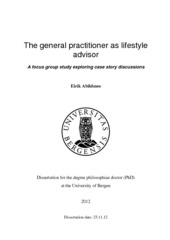| dc.contributor.author | Abildsnes, Eirik | en_US |
| dc.date.accessioned | 2013-01-16T12:31:51Z | |
| dc.date.available | 2013-01-16T12:31:51Z | |
| dc.date.issued | 2012-11-23 | eng |
| dc.identifier.isbn | 978-82-308-2128-2 | en_US |
| dc.identifier.uri | https://hdl.handle.net/1956/6269 | |
| dc.description.abstract | Background: GPs have a mandate from society to facilitate their patients to adopt a healthy lifestyle to reduce the burden of non-communicable diseases. GPs consider lifestyle counselling as an important but challenging task, but often choose not to follow clinical guidelines in lifestyle counselling. Power in doctor-patient relationships is asymmetrically distributed. In lifestyle counselling the GP may use power to make the patient change an unhealthy lifestyle. Doctors have longstanding traditions of discussing challenging clinical problems by presenting and discussing case stories. We do not know much about the interactive process of telling and discussing case stories in groups of GPs who meet regularly in CME activities. Aims: The overarching aim of this research project was to provide information about GPs’ attitudes, actions and reflections on lifestyle counselling. I defined three objectives: To identify communicative tools that GPs utilise in individual consultations concerning lifestyle change. To identify aspects of power and powerlessness in GPs’ narratives about lifestyle counselling. To explore the interactive processes of telling and discussing case stories in GPs’ small-group learning activities. Material and methods: GPs with varied background and experience attended to small-group meetings as part of specialist training or continuous medical education. The participants discussed their experience with lifestyle counselling based on presentation of case stories in focus groups. Results: To enhance change of lifestyle, GPs adjusted the organisation of their practice, and utilised visualisation tools. They established doctor-patient relationships based on shared decision making and trust, and gave their patients advice and tips to accomplish change, but they also used paternalistic approaches and rhetoric manipulation. Structural power was present in the framework of the consultation and character of the GPs’ professional role. Opportunistic approaches to changing patients’ lifestyle, rhetoric communication, paternalism and disclosure were other expressions of power in the consultations. GPs reported powerlessness in consultations when it was difficult to reach goals, and when patients resisted or ignored the GPs’ proposals. The storyline of case presentation in small-group learning was comprehensive. The participants discussed the patients’ and the doctors’ behaviour and participation in the consultations, and the handling of clinical problems in everyday practice. They reflected upon the complexity of counselling, the doctors’ role, discussed medical ethics and offered each other critique and peer support. Conclusion: The participants presented communicative tools that may support patients’ self efficacy and facilitate healthy living. Other tools may cause humiliation and promote the patient’s feelings of guilt and shame. Presence and implications of power and powerlessness in lifestyle counselling are not always visible and comprehensible. The GP’s power may potentially empower or harm the patient. Analysis of power add insight to the complex doctor-patient relationship in general, and may explain why some consultations succeed and others not. Presentations and discussions of case stories followed a detailed storyline, and initiated dialogues that highlighted patients’ perspectives and facilitated learning, discussions of best practice and reflections on medical ethics. The interaction facilitated meaning-making activity that influenced socially shared knowledge within the group. Implications: Awareness of the potentially negative consequences of using rough communicative tools may enhance beneficial lifestyle counselling in general practice. Knowledge about aspects of power and consciousness about how power affects the doctor patient relationship may facilitate counselling that improve health and avoiding unintentionally eliciting guilt and shame. The findings in this study may give health authorities and political decision-makers information about how general practitioners look upon their professional role and their mandate as lifestyle advisors. This may provide more realistic expectations about how general practitioners may contribute to healthy living in society. It would be of interest to know more about when, how and why GPs use distressing communication tools. It would also be of interest to explore how long-term patientand person-centred care among GPs can be adopted, and what kind of counselling style that best facilitate improved health-related quality of life and healthy living among patients. Power and powerlessness in doctor patient relationships may be further investigated by observational studies and patient interviews. We still do not know much about the impact of small-group activity on counselling and professional behaviour. | en_US |
| dc.language.iso | eng | eng |
| dc.publisher | The University of Bergen | eng |
| dc.relation.haspart | Paper I: Abildsnes, Eirik., Walseth, L. T., Flottorp, S. A. and Stensland, P. S. (2011) Lifestyle consultation in general practice – the doctors’ toolbox: A qualitative focus group study. Family Practice 28(2): 220-225, April 2011. Full text not available in BORA due to publisher restrictions. The article is available at: <a href="http://dx.doi.org/10.1093/fampra/cmq093" target="blank"> http://dx.doi.org/10.1093/fampra/cmq093</a> | en_US |
| dc.relation.haspart | Paper II: Abildsnes, Eirik., Walseth, L. T., Flottorp, S. A. and Stensland, P. S. (2012) Power and powerlessness. General practitioners narratives about lifestyle counselling. British Journal of General Practice 62(596): e160-e166, March 2012. Full text not available in BORA due to publisher restrictions. The article is available at: <a href="http://dx.doi.org/10.3399/bjgp12X630043" target="blank"> http://dx.doi.org/10.3399/bjgp12X630043</a> | en_US |
| dc.relation.haspart | Paper III: Abildsnes, Eirik., Flottorp, S. A. and Stensland, P. S. (2012) Case stories in general practice: A focus group study. BMJ Open 2012;2:e001208, August 2012. The article is available at: <a href="http://hdl.handle.net/1956/6268" target="blank">http://hdl.handle.net/1956/6268</a> | en_US |
| dc.title | The general practitioner as lifestyle advisor. A focus group study exploring case story discussions | en_US |
| dc.type | Doctoral thesis | |
| dc.rights.holder | Copyright the author. All rights reserved | |
